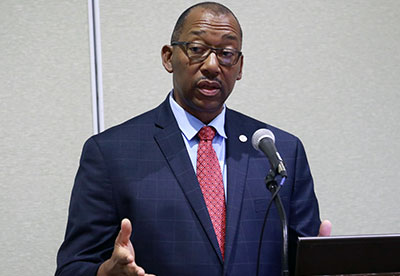Black Psychiatrists Persevered Despite Discrimination in Education, Organized Medicine

Solomon Carter Fuller, M.D., who is considered the first African American psychiatrist, completed his medical degree in 1897. But blacks as psychiatric physicians became much more common beginning in the 1920s, said Billy E. Jones, M.D., a psychiatrist at the VA NY Harbor Healthcare System in New York, in the APA History Track session “The 175-Year History of African Americans in Psychiatry.”
Fuller mentored George Branche, M.D., Simon O. Johnson, M.D., and Toussaint Tilden, M.D., all 1923 graduates of medical schools in Boston. They were joined by Rafael Hernandez, M.D., who taught at Meharry Medical College, and by Ernest Williams, M.D., a professor and chair of psychiatry at Howard University, two historically black institutions.
Meharry and Howard were the only two of nine black medical schools still in operation after the Flexner Report in 1908 led to the reform of American medical education, said panelist Steven Starks, M.D., a geriatric psychiatrist and an American Political Science Association Congressional Fellow in health and aging policy who works in the Office of the Speaker of the U.S. House of Representatives.
“In effect, Flexner reinforced segregated and unequal medical education and unequal medical treatment for blacks,” said Starks. “Alternatively, he could have recommended integrating white schools, creating segregated branches [of white schools], providing additional resources, or increasing resources to colleges that did meet his standards.” That did not happen, however.
Organized medicine in general was historically unfriendly to black physicians, said Starks. The AMA’s 1906 directory of black physicians listed them as “colored” and placed limitations on their access to insurance and business loans. The AMA effectively supported racial discrimination for much of the 20th century until a 1968 change in its constitution permitted expulsion of its local societies that practiced discrimination in membership. Only in 2008 did the AMA formally acknowledge and apologize for its actions.
APA had its own troublesome history with regard to black patients and psychiatrists. The history of APA’s first 100 years contains only three paragraphs on African Americans, said Starks. APA’s president-elect, Winfred Overholser, M.D., opposed the desegregation of Veterans Administration hospitals even as President Harry Truman was signing an order to the contrary.
Donna Norris, M.D., noted the rise of a think tank of African American psychiatrists led by Harvard’s Chester Pierce, M.D., that was active beginning in the 1950s. In 1969, the Ad Hoc Committee of Black Psychiatrists called for a greater role in the Association. The result was a slowly increasing role for black psychiatrists in APA. Charles Prudhomme, M.D., became the first black officer of APA when he was elected vice president for the 1970-1971 term. Mildred Mitchell-Bateman, M.D., held the same office in the 1973-1974 term, followed by June Jackson Christmas, M.D., in the 1974-1975 term.
Panelist Rahn Bailey, M.D. (pictured above), a professor of psychiatry at Wake Forest University, former president of the National Medical Association, and a member of APA’s Membership Committee, addressed the issue of African Americans in the criminal justice system.
“Forensic psychiatrists should regard themselves and their subjects as human beings, while being in touch with their biases so that we do not look at them through the prism of stereotyping,” said Bailey. “Psychiatrists dealing with minority subjects must be cognizant of the psychological and social/cultural truths that may influence patients. We also have to find ways to address our own biases that are fair and equitable that don’t leak out into assessments and reports.”
Efforts to eliminate racial discrimination are still needed, said Ezra Griffith, M.D., a professor emeritus of psychiatry and deputy chair for diversity and organizational ethics in the Department of Psychiatry at the Yale School of Medicine.
“That work requires a commitment to our common humanity,” he said. “Having an affinity for our own group should not be linked to rejection of others. The dignity of those with whom we come in contact is critical. All of us want to maintain our dignity.”
(Image: David Hathcox)
|
|
|
|
|

